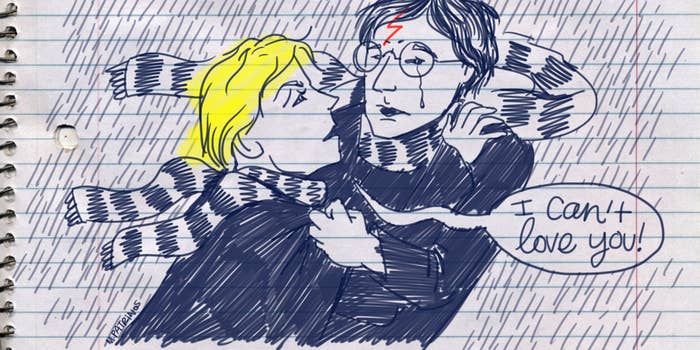It's not exactly a secret that fan fiction — stories written by fans of books, movies, or TV series about their favorite characters — is a thriving part of internet culture. There are entire websites (like Wattpad, Archive of Our Own, and FanFiction.net) dedicated to hosting works that often clock in at novel length; truth be told, most writers who are coming of age now have grown up reading and writing fan fiction of their own. I myself wrote thousands and thousands of words of Harry Potter fan fiction all the way up through college. (You can still find it if you want to try. I apologize in advance.)
Over time, young adult authors have embraced the popularity of fan fiction and all that it entails. Rainbow Rowell's acclaimed YA novel Fangirl was the first to examine fandom culture from the perspective of a girl who grew up with it. Her forthcoming book, Carry On, focuses on the characters that Fangirl's protagonist Cath adored so much.
I had the chance to catch up with Rowell and chat about fan fiction, her new book, and the power of seeing yourself in the things you love. Here's what she had to say:

Kaye Toal: So I think it's fascinating that you're kind of writing fanfic about fanfic, or would you consider it the other way around? I.e. building a world that was originally built out for fanfic ... in a book about fandom. Is that experience strange, or did the world already exist to a large extent for you?
Rainbow Rowell: Hmmm. Well, when I started Fangirl, I knew I wanted to use the Simon Snow stuff as a way to talk about fandom and fan fiction, and specifically about Cath's fandom. How it fit into her life. What it meant to her. But I also wanted to feel like those characters — Simon, Baz, Penelope — were mine, and like the story itself could live on its own, not just as a metaphor for other stories. Am I making sense so far?
KT: Yes, absolutely.
RR: But in writing about Simon — through Cath at different ages and through [the author of the book in Fangirl] Gemma T. Leslie, I realized that I really wanted to write for myself. That I had a lot invested in him as a character, and that I had a lot invested in this type of story. The "chosen one" narrative. That is a story that I've always been a sucker for, as a reader and as a person, so I decided to try it, to see how I would tell Simon's story.
Carry On is a standalone book. You don't have to read Fangirl. I approached it as — I'm writing Simon's story now. And I'm not thinking about Cath or what he means to Cath. I'm taking what I created in Fangirl, and I'm telling it my way.
KT:I love that. I feel like that's actually a very fandom thing to do, as well, which feels appropriate — to take a story you love and tell it the way you want to tell it, though in fandom you're often taking characters and reinterpreting them.
RR: Right. I mean, Carry On for me is very much about all the fiction I've read and loved. I've always been a sci-fi and fantasy person. I'm still using Simon as a way to process my feelings about Luke Skywalker, Frodo, Arthur, and Harry Potter. And also probably Jesus.
KT: The actual story of Jesus, whether you take it as a myth or an allegory or what, really is fascinating.
RR: Yes! I'm not calling Jesus fiction. But I went to church three times a week as a kid, and I think that primed me for these sorts of stories. YOU ARE THE CHOSEN ONE. YOU MUST SAVE THE WORLD.
KT: Right! And the sacrifices asked of THE CHOSEN ONE are so huge.
RR: YES. And the chosen one always says, "OK. Seems legit."
KT: And yet feel so familiar, even if you as a person are never actually asked to, say, lay down your life for the good of your people.
RR: Well, I think we all sort of want to be chosen. Because being chosen means having a purpose. Being chosen gives your life meaning and clarity.
KT: And it makes pain so much more bearable, in some ways, whereas a teenager struggling with depression may find it hard to figure out whether their pain and their life has meaning.
RR: Absolutely! All thinking people struggle with, "My pain isn't random. It has a purpose. Good will come of it." Adults struggling with depression feel the same thing, with the added weight of feeling they should have it all figured out by now.
KT: Yeah, that's true. I've written pretty candidly about my experiences with that, and I think fandom for me — and for others, too — is part of trying to give their pain vicarious meaning through relating to these characters and writing them to be representative. Like, explicitly queering characters in fan fiction who are not explicitly queer in text — Draco, Remus, and Sirius, just as a few examples — seems like part of that, too.
RR: I think we've been using fiction and story to sort out our lives since always. When I was a teenager, fandom didn't exist in the same way. Like, I didn't know that word, "fandom." And "fan fiction" wasn't a concept I had. But I was still writing fanfiction in my head and on paper.
I think, when we love a story, we want to make it our own. We want to bring it inside ourselves. But, for me, most of the stories I loved were about white, straight men. And they were mostly stories without romantic love. So, I think, when we love a story like Sherlock or Lord of the Rings, it's natural to want to bring it into ourselves, and add the things we're longing for.

KT: Did anyone read what you wrote when you were a kid? Was there community around being a fan of something?
RR: There really wasn't community around fandom when I was a kid. I know there were mailing lists and zines and maybe things happening in bigger cities, but I would have had no access to that. No way of even knowing about it. So I would love something deeply, mostly by myself. My best friend and I would really try to love things together and for each other so we'd have someone to share that with. We clicked initially because we were both girls who loved Star Wars. And then we got really into the Beatles and U.K. bands of the '80s.
KT: I'm glad that the internet hasn't actually changed that friendship, but maybe made it even easier to do that for someone else you love.
RR: Oh, the internet has made it so much better! To find community. To forge strong friendships. To find people you CLICK with.
KT: How do you feel now, when people have built communities around fanworks for your books?
RR: I don't think I have a sense of people building community around my own work…but I do know a number of women who have met through reading my books and talking to me on Twitter. And that's really cool because they're all really great. It makes me feel good to think that such GREAT people love my books.
KT: The community I've noticed that's built up around your books feels organic in the sense that some girls feel genuinely represented.
RR: That's so good to hear. I think it's something that I don't have the best sense of. I talk to people individually, but I don't always see how people are talking to each other about my books. The closest I get to that, I think, is at readings, when people are waiting in line for signings, or waiting for me to talk and everybody always seems really happy. Like, they're talking, and I'll think they must all know each other, but I'll find out later that they just met in line. And it's not something I feel responsible for, but I do get a sense that this event and these people and me — we're all part of something really good for the moment. I think women feel really safe at my events.

KT: I did want to ask also about transformative fandom (in the sense that young writers are writing their own stories about a much wider range of identities, using beloved characters that aren't technically theirs), and whether you think that it's influenced YA especially — like the #WeNeedDiverseBooks movement, for instance. Judy Blume's been writing amazing diverse books for ages, but for a while, at least when I was a kid, it seemed like she was the only one. Do you think that's changing?
RR: I think the internet and social media have made the biggest difference, because there was no way for people to talk or be heard before. We had such a top-down model for EVERYTHING. We as consumers and readers and citizens largely accepted what was offered to us — because that's all that was being offered. And the people doing the offering kept doing what they were doing because it's what they've always done, and change happened so slowly.
I was thinking this week about how much my own brain has changed regarding beauty. I went almost 40 years without seeing anyone presented as beautiful unless they met a really narrow standard. I never saw fat women presented as beautiful. I think Tumblr, specifically, has actually healed my brain. It's exposed me to so many types of beauty. And I realized that I have widened my own standards to include myself.
I think fandom — online fandom especially — is part of a larger movement. We all get to be part of the conversation now. And our voices come together.

A special edition of Fangirl, including fanart, is now available in a couple of different colors. Carry On will hit shelves in October 2015.
